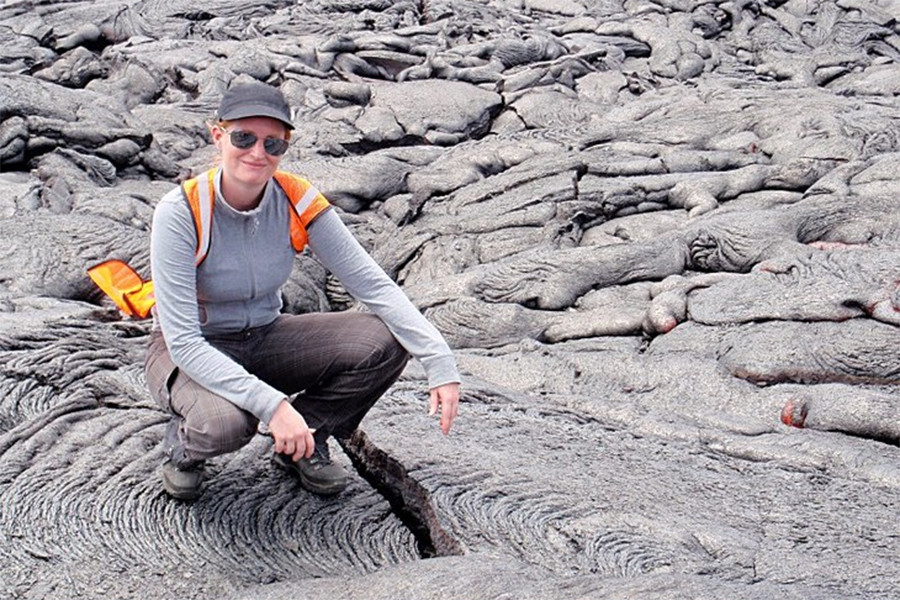
Wauthier awarded NSF CAREER award to investigate volcanic flank instability
Posted on August 25, 2020UNIVERSITY PARK, Pa. — Christelle Wauthier, associate professor of geosciences in the College of Earth and Mineral Sciences, received a Faculty Early Career Development Program (CAREER) Award from the National Science Foundation to develop numerical models to characterize volcanic flank instability processes.
Massive collapse of volcanic flanks are among the largest mass-wasting events on the planet and can evolve into energetic lateral blasts and spawn dangerous tsunamis. Despite these potential hazards, the underlying processes remain poorly constrained and understood, according to Wauthier.
Her research will focus on flank collapse on ocean island volcanoes and in using modeling to unravel the observed complexity in data sets representing different types of volcanoes.
“Ocean island volcanoes tend to have unstable flanks so a side of the volcano can become unstable and slip in the ocean and potentially trigger a tsunami wave,” Wauthier said. “That is a huge hazard for people living in the surrounding areas. So, the goal of this research is to try to understand better how this could happen by characterizing these hazards of flank instability that potentially lead to collapse.”
Better understanding of the variations in style and timing of the collapse of ocean island volcanoes requires more accurate and realistic process-based models of volcano deformation.
Wauthier, an Institute for Computational and Data Sciences co-hire, will use the five-year CAREER award, which started Aug. 1, to develop mechanically realistic numerical models to investigate why the style, behavior and timing of the cyclic growth then destruction of volcanic edifices varies across such a wide spectrum.
“Specifically, this work will explore how styles of collapse are primarily controlled by the evolved size, steepness, structure and strength of the edifice of the volcano,” Wauthier said. “To develop an understanding of how growth and collapse of ocean island volcanoes vary in style and timing, I will benchmark and apply novel numerical modeling strategies using finite element models for flank motion, with a focus on a complementary spectrum of volcano genetic types, sizes and flank instability behaviors.”
The reasons behind initiation and persistence or arrest of flank collapse need to be explored and modeled accurately for a wide range of volcanoes affected by distinct flank processes.
Wauthier’s initial suite of volcanoes will include Kilauea in the Hawaiian Islands, Piton de la Fournaise in France, and Anak Krakatau in Indonesia, spanning large to small, shallow to steep and shield to stratovolcano for which extensive observations are available and where contrasting modes of recent failures are evident.
“They’re all ocean island volcanoes but all three volcanoes are very different,” Wauthier said. “They have different styles of eruptive activity, different morphologies, and different heights. That will allow me to test theoretical models developed using finite element models and calibrate them against real cases where there are a lot of data available.”
Wauthier said the expected project outcomes have the potential to illuminate key mechanisms triggering and sustaining the massive collapse of volcano flanks and their associated and potentially catastrophic hazards.
“This research will aid in the forecasting of volcanic and flank motion unrest, which has the potential to save lives,” Wauthier said.
Wauthier’s CAREER award includes an integrated research and education plan.
“The ensemble goal is to generate educational resources and teaching materials for courses in natural hazards, volcanology and geophysics, including a large-enrollment general education class for non-science majors,” Wauthier said.
Wauthier also hopes to address the lack of diversity in the geosciences though her CAREER award.
“I plan on funding underrepresented minority students to come to Penn State over the summer and work with me on this project,” Wauthier said. “Undergraduate students will also be able to participate through research for senior theses.”
The National Science Foundation’s (NSF) Faculty Early Career Development (CAREER) Program recognizes the potential of early-career faculty to serve as academic role models in research and education.
Share
Related Posts
- Careful analysis of volcano’s plumbing system may give tips on pending eruptions
- Impact of sea ice loss on weather, cold air outbreaks focus of NSF CAREER Award
- Penn State awarded $3.4 million contract to target plastic waste
- GIS technology helps map out how America’s mafia networks were ‘connected’
